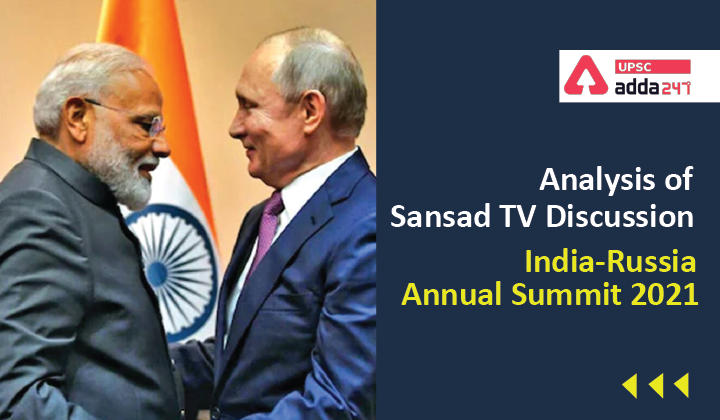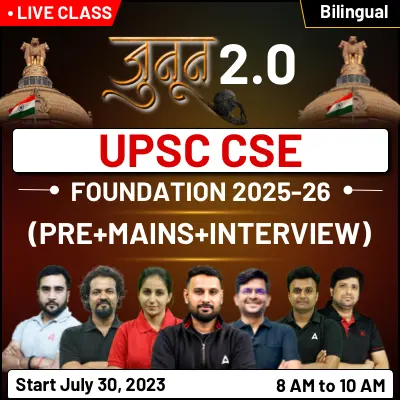Table of Contents
Context
Russian President Vladimir Putin along with his delegation came to an official visit to India on 6th December – for the 21st India-Russia Annual Summit with Prime Minister Narendra Modi.
Background
- The visit is in continuation of the tradition of Annual Summits alternately in India and Russia.
- The last such summit was held in September 2019 during the visit of Prime Minister Modi to Vladivostok in Russia.
- The Annual Summit could not take place in 2020 due to the Covid-19 pandemic situation.
How this meet was special?
- This was the first in-person meeting of the Russian President and Prime Minister Narendra Modi after their meeting on the sidelines of the BRICS summit in Brasilia in November 2019.
- Although there have been several virtual meetings for multilateral summits and telephonic conversations between the two leaders.
- Putin and Prime Minister Modi reviewed the state and prospects of bilateral relations and discuss ways to further strengthen the strategic partnership between the two countries.
- The Summit also afforded an opportunity to exchange views on regional, multilateral and international issues of mutual interest.
- The annual summit was preceded by the inaugural 2+2 dialogue of the defence and foreign ministers of India and Russia, and further strengthened the strategic partnership between the two countries.
The range of issues that President Putin and Prime Minister Modi Discussed?
- President Putin was accompanied by a high-level delegation.
- Bilateral talks between Prime Minister Modi and President Putin were held.
- The two leaders expressed satisfaction at the sustained progress in the ‘Special and Privileged Strategic Partnership’ between both countries despite the challenges posed by the Covid pandemic.
- They welcomed the holding of the first meeting of the 2+2 Dialogue of Foreign and Defence Ministers and the meeting of the Inter-Governmental Commission on Military & Military-Technical Cooperation in New Delhi on 6 December 2021.
- The leaders underscored the need for greater economic cooperation and in this context, emphasized on new drivers of growth for long term predictable and sustained economic cooperation.
- They appreciated the success story of mutual investments and looked forward to greater investments in each others’ countries.
- The role of connectivity through the International North-South Transport Corridor (INSTC) and the proposed Chennai – Vladivostok Eastern Maritime Corridor was figured in the discussions.
- The two leaders looked forward to greater inter-regional cooperation between various regions of Russia, in particular with the Russian Far East, with the States of India.
- They appreciated the ongoing bilateral cooperation in the fight against the Covid pandemic, including humanitarian assistance extended by both countries to each other in critical times of need.
- The leaders discussed regional and global developments, including the post-pandemic global economic recovery, and the situation in Afghanistan.
- They agreed that both countries share common perspectives and concerns on Afghanistan and appreciated the bilateral roadmap charted out at the NSA level for consultation and cooperation on Afghanistan.
- They noted that both sides shared common positions on many international issues and agreed to further strengthen cooperation at multilateral fora, including at the UN Security Council.
- President Putin congratulated Prime Minister Modi for India’s ongoing non-permanent membership of the UN Security Council and successful Presidency of BRICS in 2021.
- Prime Minister Modi congratulated Russia for its ongoing chairmanship of the Arctic Council.
Which agreements were signed?
- The joint statement titled India-Russia: Partnership for Peace, Progress and Prosperity aptly covered the state and prospects of bilateral ties.
- Coinciding with the visit, several Government-to-Government Agreements and MoUs, as well as those between commercial and other organizations of both countries, were signed in different sectors such as trade, energy, science & technology, intellectual property, outer space, geological exploration, cultural exchange, education, etc. This is a reflection of the multifaceted nature of our bilateral partnership.
- India signed four agreements with Russia at the first 2+2 meeting between the foreign and defence ministers of the two countries.
The importance of India and Russia Bilateral Ties?
- Both countries share a longstanding and time-tested partnership and further development of this relationship has been a key pillar of India’s foreign policy.
- Since the signing of the “Declaration on the India-Russia Strategic Partnership” in October 2000 bilateral ties have acquired a qualitatively new character with enhanced levels of cooperation in almost all areas including political, security, defence, trade and economy, science and technology, and culture.
- The Annual Summit meeting between the Prime Minister of India and the President of the Russian Federation is the highest institutionalized dialogue mechanism in the strategic partnership between India and Russia.
- 21st Annual Summit between the two leaders took place on Monday during President Putin’s visit to India.
- Both leaders reviewed various aspects of bilateral relations and discussed ways to further strengthen the all-encompassing partnership Defence and Foreign Ministers of both countries also held the first-ever 2+2 dialogue between both countries and discussed several issues of common concern.
- The two sides have worked “very closely” on the issue of threats of terrorism, terrorist financing, the flow of arms and drugs trade.
- Delhi and Moscow have worked together on at least three major multilateral groupings — Russia-India-China (RIC), BRICS and SCO (Shanghai Cooperation Organisation).
- Flowing from the understanding that Russia has leverage over Beijing because of recent proximity, and New Delhi has had a history of robust bilateral ties with Moscow, the present outreach is significant.
- Although New Delhi has consciously diversified its new purchases from other countries, the bulk of its defence equipment is from Russia.
Shared Interests
- The Covid-19 pandemic has raised questions about the current model of global affairs, but the long-standing challenges remain even as new ones emerge, prominent among them are terrorism violent extremism and radicalization.
- The situation in Afghanistan has wider repercussions including for Central Asia.
- The Middle East continues to present hotspots.
- Maritime security and safety is another domain of shared concern.
- We both have a common interest in ASEAN centrality and ASEAN-driven platforms.
- Both Russia and India have a similar worldview of a more poly-centric, more multipolar, more equitable world order.
- Russia has been one of the largest arms exporters to India. Even as Russia’s share in India’s arms imports fell by over 50 per cent in the last five-year period compared to the previous five years (2011–2015).
- In the last 20 years, India imported arms and weapons worth US$ 35 billion from Russia, according to the Stockholm International Peace Research Institute which tracks global arms trade.


 TSPSC Group 1 Question Paper 2024, Downl...
TSPSC Group 1 Question Paper 2024, Downl...
 TSPSC Group 1 Answer key 2024 Out, Downl...
TSPSC Group 1 Answer key 2024 Out, Downl...
 Cabinet Ministers of India 2024, New Cab...
Cabinet Ministers of India 2024, New Cab...







